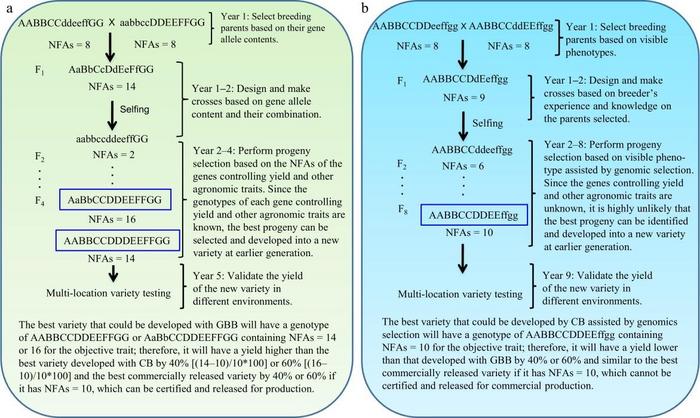A research team has demonstrated that gene-based breeding (GBB) offers a transformative approach to advancing plant and animal breeding, showing remarkable predictability, speed, and cost-effectiveness. The review highlights GBB’s impact on improving crop and livestock genetics, while also laying the foundation for molecular precision agriculture and medicine. This strategic integration of genomics into breeding and healthcare could significantly improve the quality and efficiency of global food supplies and health services, marking a pivotal shift from traditional methods to more targeted, gene-based strategies.

Credit: The authors
A research team has demonstrated that gene-based breeding (GBB) offers a transformative approach to advancing plant and animal breeding, showing remarkable predictability, speed, and cost-effectiveness. The review highlights GBB’s impact on improving crop and livestock genetics, while also laying the foundation for molecular precision agriculture and medicine. This strategic integration of genomics into breeding and healthcare could significantly improve the quality and efficiency of global food supplies and health services, marking a pivotal shift from traditional methods to more targeted, gene-based strategies.
Amid rapidly growing global populations and climate change, food production and security have emerged as critical global challenges. The dramatic shifts in climate, such as rising temperatures and unpredictable rainfall, are exacerbating these challenges, compelling the agricultural sector to innovate ways to sustain and increase food supply. The consensus among researchers is that developing genetically improved crop varieties and livestock strains offers a sustainable solution. Various molecular techniques are pivotal, with GBB as particularly effective for developing new varieties with complete intellectual properties.
A study (DOI: 10.48130/tp-0024-0005) published in Tropical Plants on 20 February 2024, this review extensively covers GBB, highlighting its transformative impact on the development of crop varieties and livestock strains.
GBB employs sophisticated artificial intelligence to optimize every phase of the breeding cycle—from parent selection through progeny evaluation—using genetic markers like SNPs and InDels to drive decision-making. This approach has significantly outperformed traditional methods in terms of speed, accuracy, and cost efficiency. Particularly notable are the applications of GBB in cotton and maize, where it has been instrumental in enhancing fiber length and grain yield. In cotton, studies using GBB have achieved a prediction accuracy for fiber length of 0.83–0.86, correlating strongly with actual phenotypes and demonstrating superior performance over genomic selection methods. Similarly, in maize, the integration of GBB has enabled the prediction of inbred line grain yields and F1 hybrid performance with high reliability, providing a substantial improvement over conventional selection methods. This review also emphasizes the broader implications of GBB for molecular precision agriculture and medical science, suggesting that this technology could revolutionize fields beyond agriculture. For example, the potential for adapting these methodologies to human and veterinary medicine could lead to breakthroughs in genotypic medicine, offering more personalized and effective treatments based on genetic profiles.
According to the study’s researcher, Prof. Hong-Bin Zhang, “GBB can be a revolutionary technology for breeding in all field crops, vegetable crops, fruit trees, and livestock for either pure-line varieties (or strains) or hybrid varieties, but only a preliminary GBB system has been established to date in maize and cotton. Additional research is necessary to develop the GBB in maize and cotton into robust GBB systems that are suited for enhanced breeding across environments and populations in different breeding programs.”
Overall, this review highlights that GBB represents a pioneering advancement in genetic science, with the power to significantly enhance both agricultural output and medical treatments through precise genetic manipulation and analysis.
###
References
DOI
Original Source URL
Authors
Hong-Bin Zhang*
Affiliations
Department of Soil and Crop Sciences, Texas A & M University, College Station, Texas 77843-2474, USA
Journal
Tropical Plants
Method of Research
Experimental study
Subject of Research
Not applicable
Article Title
Gene-based Breeding (GBB), a novel discipline of biological science and technology for plant and animal breeding
Article Publication Date
20-Feb-2024
COI Statement
The authors declare that they have no competing interests.



